Nursing Management and Pharmacokinetics: Mr. Ferguson's Case Report
VerifiedAdded on 2021/01/01
|7
|2024
|43
Report
AI Summary
This nursing report presents a case study of Mr. Ferguson, a 76-year-old patient admitted to the emergency department with chest heaviness and shortness of breath. The report details Mr. Ferguson's presenting problems, including angina, non-ST-elevation myocardial infarction (non-STEMI), hypertension, and hypercholesterolemia, along with their pathophysiological implications. It then explains the pharmacokinetics of the medications prescribed, such as aspirin, morphine sulfate, heparin, and fentanyl, and their respective indications. The report further discusses the appropriate nursing management strategies, emphasizing the importance of managing adverse effects of medications. Finally, it outlines the critical information that should be shared with the patient regarding their condition, medication interactions, and long-term effects, along with patient education strategies. The report concludes with a review of the case and relevant references.
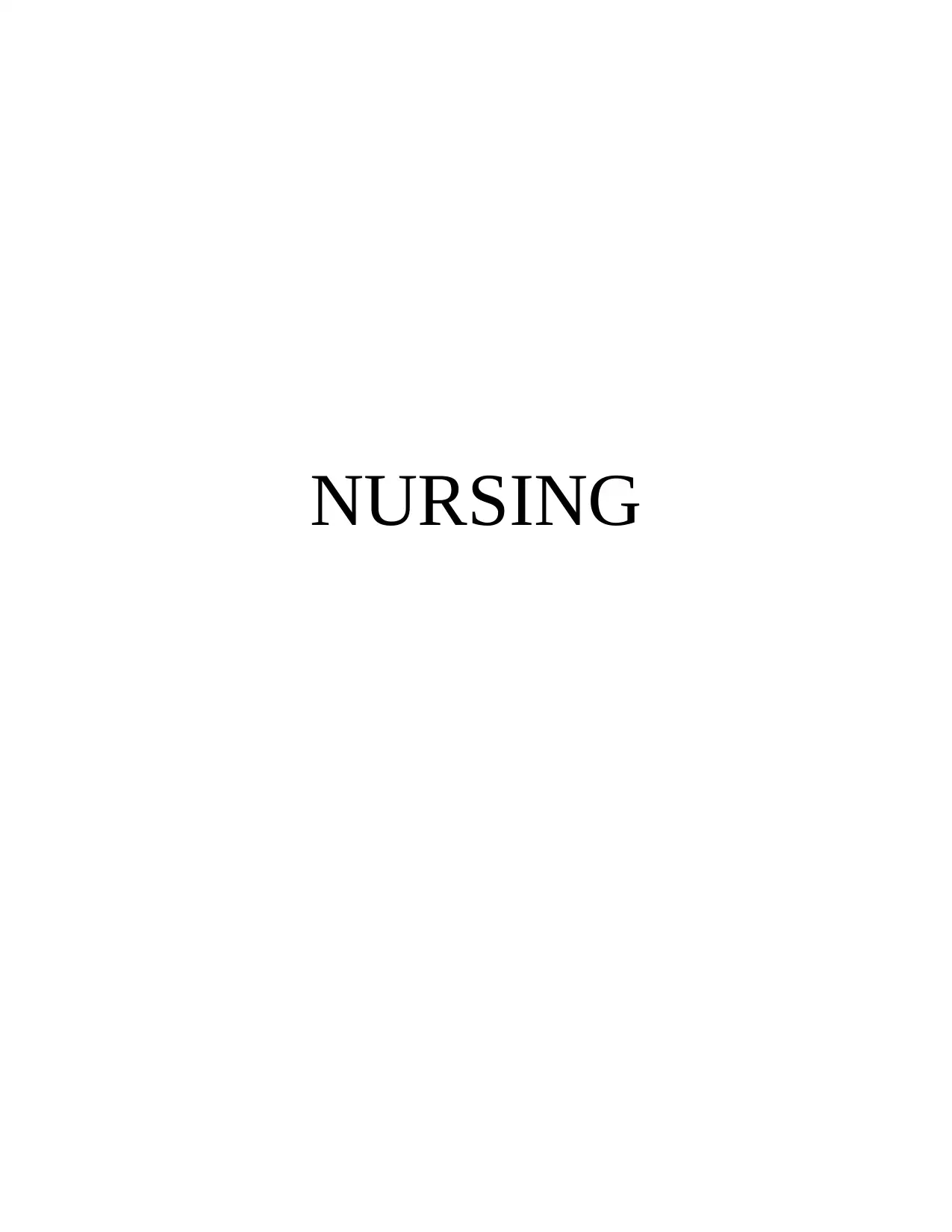
NURSING
Paraphrase This Document
Need a fresh take? Get an instant paraphrase of this document with our AI Paraphraser
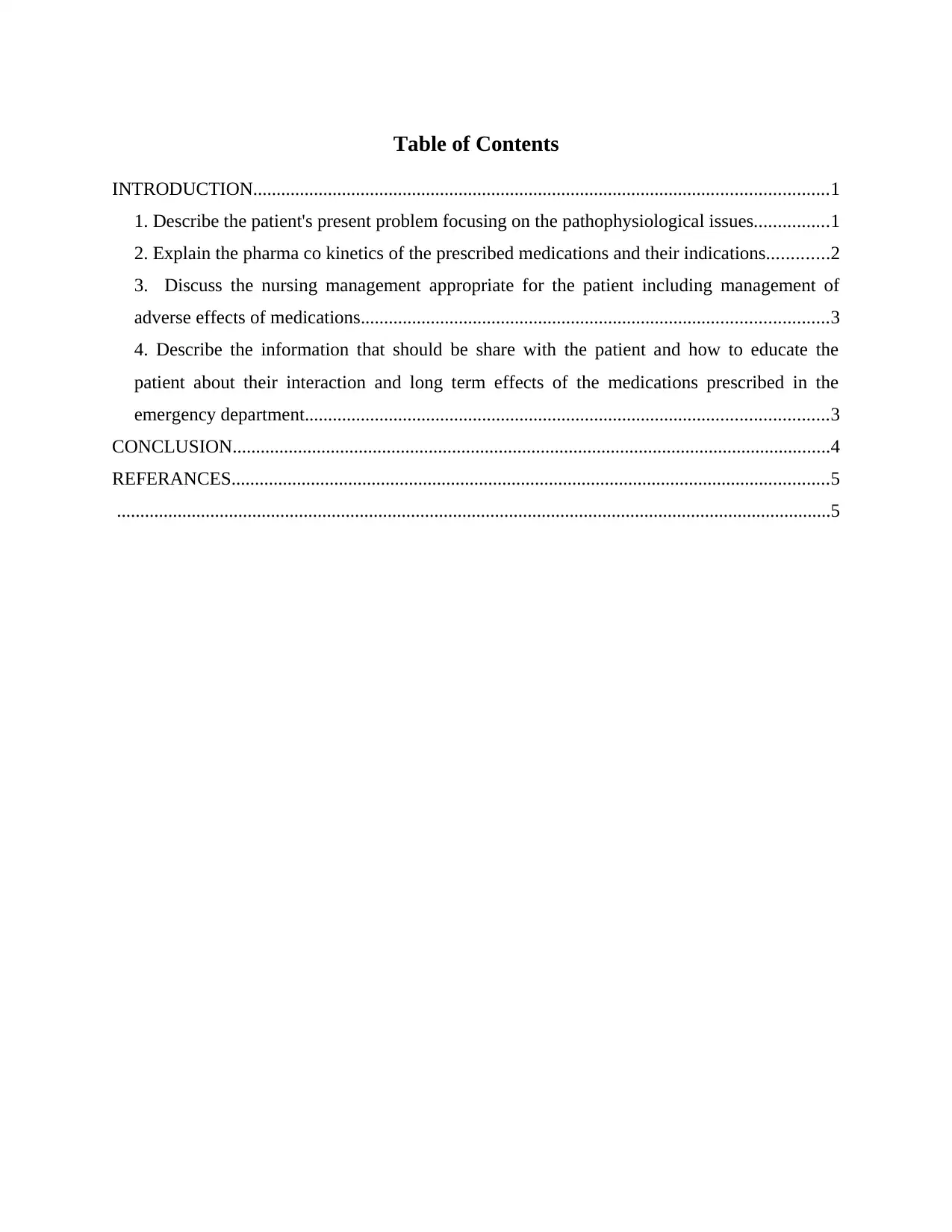
Table of Contents
INTRODUCTION...........................................................................................................................1
1. Describe the patient's present problem focusing on the pathophysiological issues................1
2. Explain the pharma co kinetics of the prescribed medications and their indications.............2
3. Discuss the nursing management appropriate for the patient including management of
adverse effects of medications....................................................................................................3
4. Describe the information that should be share with the patient and how to educate the
patient about their interaction and long term effects of the medications prescribed in the
emergency department................................................................................................................3
CONCLUSION................................................................................................................................4
REFERANCES................................................................................................................................5
.........................................................................................................................................................5
INTRODUCTION...........................................................................................................................1
1. Describe the patient's present problem focusing on the pathophysiological issues................1
2. Explain the pharma co kinetics of the prescribed medications and their indications.............2
3. Discuss the nursing management appropriate for the patient including management of
adverse effects of medications....................................................................................................3
4. Describe the information that should be share with the patient and how to educate the
patient about their interaction and long term effects of the medications prescribed in the
emergency department................................................................................................................3
CONCLUSION................................................................................................................................4
REFERANCES................................................................................................................................5
.........................................................................................................................................................5
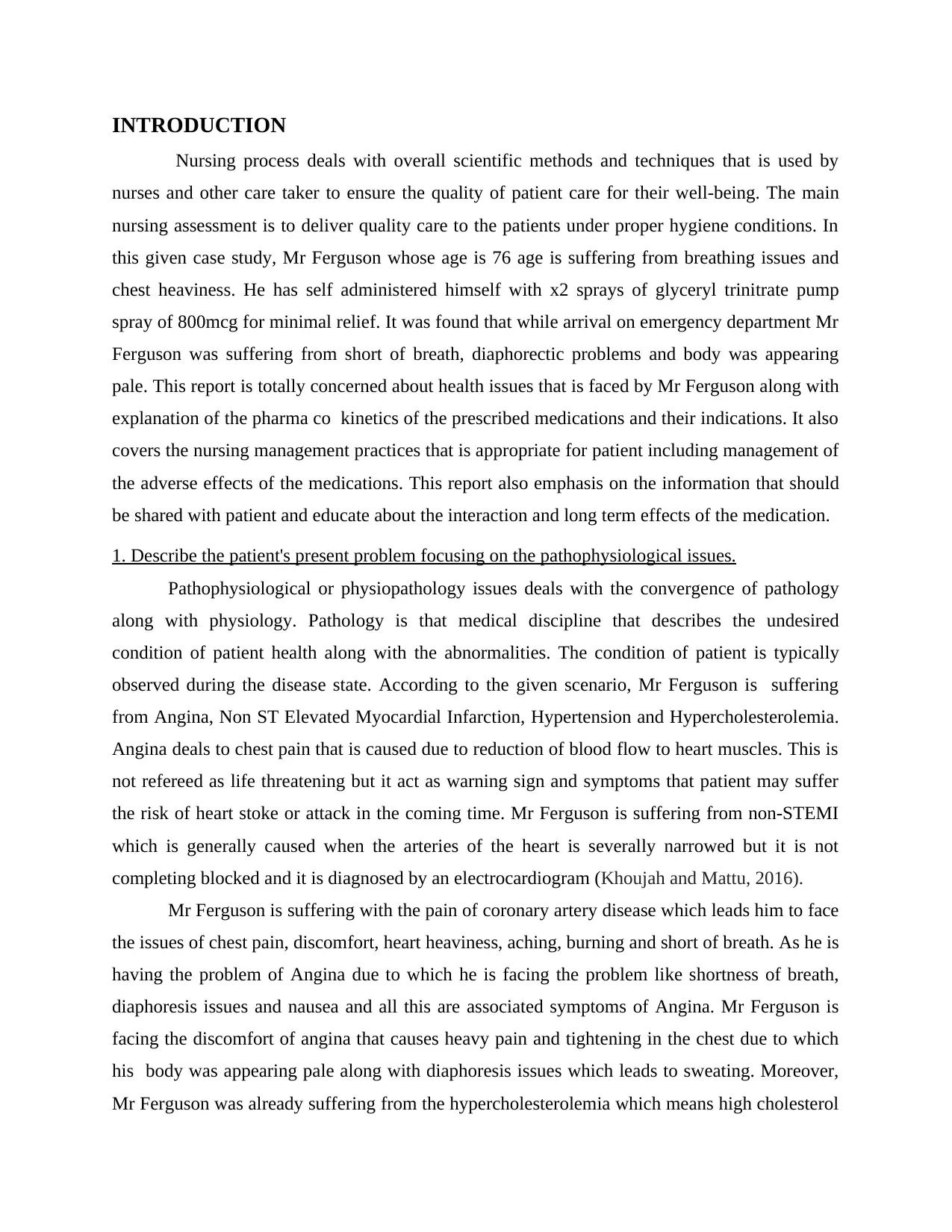
INTRODUCTION
Nursing process deals with overall scientific methods and techniques that is used by
nurses and other care taker to ensure the quality of patient care for their well-being. The main
nursing assessment is to deliver quality care to the patients under proper hygiene conditions. In
this given case study, Mr Ferguson whose age is 76 age is suffering from breathing issues and
chest heaviness. He has self administered himself with x2 sprays of glyceryl trinitrate pump
spray of 800mcg for minimal relief. It was found that while arrival on emergency department Mr
Ferguson was suffering from short of breath, diaphorectic problems and body was appearing
pale. This report is totally concerned about health issues that is faced by Mr Ferguson along with
explanation of the pharma co kinetics of the prescribed medications and their indications. It also
covers the nursing management practices that is appropriate for patient including management of
the adverse effects of the medications. This report also emphasis on the information that should
be shared with patient and educate about the interaction and long term effects of the medication.
1. Describe the patient's present problem focusing on the pathophysiological issues.
Pathophysiological or physiopathology issues deals with the convergence of pathology
along with physiology. Pathology is that medical discipline that describes the undesired
condition of patient health along with the abnormalities. The condition of patient is typically
observed during the disease state. According to the given scenario, Mr Ferguson is suffering
from Angina, Non ST Elevated Myocardial Infarction, Hypertension and Hypercholesterolemia.
Angina deals to chest pain that is caused due to reduction of blood flow to heart muscles. This is
not refereed as life threatening but it act as warning sign and symptoms that patient may suffer
the risk of heart stoke or attack in the coming time. Mr Ferguson is suffering from non-STEMI
which is generally caused when the arteries of the heart is severally narrowed but it is not
completing blocked and it is diagnosed by an electrocardiogram (Khoujah and Mattu, 2016).
Mr Ferguson is suffering with the pain of coronary artery disease which leads him to face
the issues of chest pain, discomfort, heart heaviness, aching, burning and short of breath. As he is
having the problem of Angina due to which he is facing the problem like shortness of breath,
diaphoresis issues and nausea and all this are associated symptoms of Angina. Mr Ferguson is
facing the discomfort of angina that causes heavy pain and tightening in the chest due to which
his body was appearing pale along with diaphoresis issues which leads to sweating. Moreover,
Mr Ferguson was already suffering from the hypercholesterolemia which means high cholesterol
Nursing process deals with overall scientific methods and techniques that is used by
nurses and other care taker to ensure the quality of patient care for their well-being. The main
nursing assessment is to deliver quality care to the patients under proper hygiene conditions. In
this given case study, Mr Ferguson whose age is 76 age is suffering from breathing issues and
chest heaviness. He has self administered himself with x2 sprays of glyceryl trinitrate pump
spray of 800mcg for minimal relief. It was found that while arrival on emergency department Mr
Ferguson was suffering from short of breath, diaphorectic problems and body was appearing
pale. This report is totally concerned about health issues that is faced by Mr Ferguson along with
explanation of the pharma co kinetics of the prescribed medications and their indications. It also
covers the nursing management practices that is appropriate for patient including management of
the adverse effects of the medications. This report also emphasis on the information that should
be shared with patient and educate about the interaction and long term effects of the medication.
1. Describe the patient's present problem focusing on the pathophysiological issues.
Pathophysiological or physiopathology issues deals with the convergence of pathology
along with physiology. Pathology is that medical discipline that describes the undesired
condition of patient health along with the abnormalities. The condition of patient is typically
observed during the disease state. According to the given scenario, Mr Ferguson is suffering
from Angina, Non ST Elevated Myocardial Infarction, Hypertension and Hypercholesterolemia.
Angina deals to chest pain that is caused due to reduction of blood flow to heart muscles. This is
not refereed as life threatening but it act as warning sign and symptoms that patient may suffer
the risk of heart stoke or attack in the coming time. Mr Ferguson is suffering from non-STEMI
which is generally caused when the arteries of the heart is severally narrowed but it is not
completing blocked and it is diagnosed by an electrocardiogram (Khoujah and Mattu, 2016).
Mr Ferguson is suffering with the pain of coronary artery disease which leads him to face
the issues of chest pain, discomfort, heart heaviness, aching, burning and short of breath. As he is
having the problem of Angina due to which he is facing the problem like shortness of breath,
diaphoresis issues and nausea and all this are associated symptoms of Angina. Mr Ferguson is
facing the discomfort of angina that causes heavy pain and tightening in the chest due to which
his body was appearing pale along with diaphoresis issues which leads to sweating. Moreover,
Mr Ferguson was already suffering from the hypercholesterolemia which means high cholesterol
You're viewing a preview
Unlock full access by subscribing today!
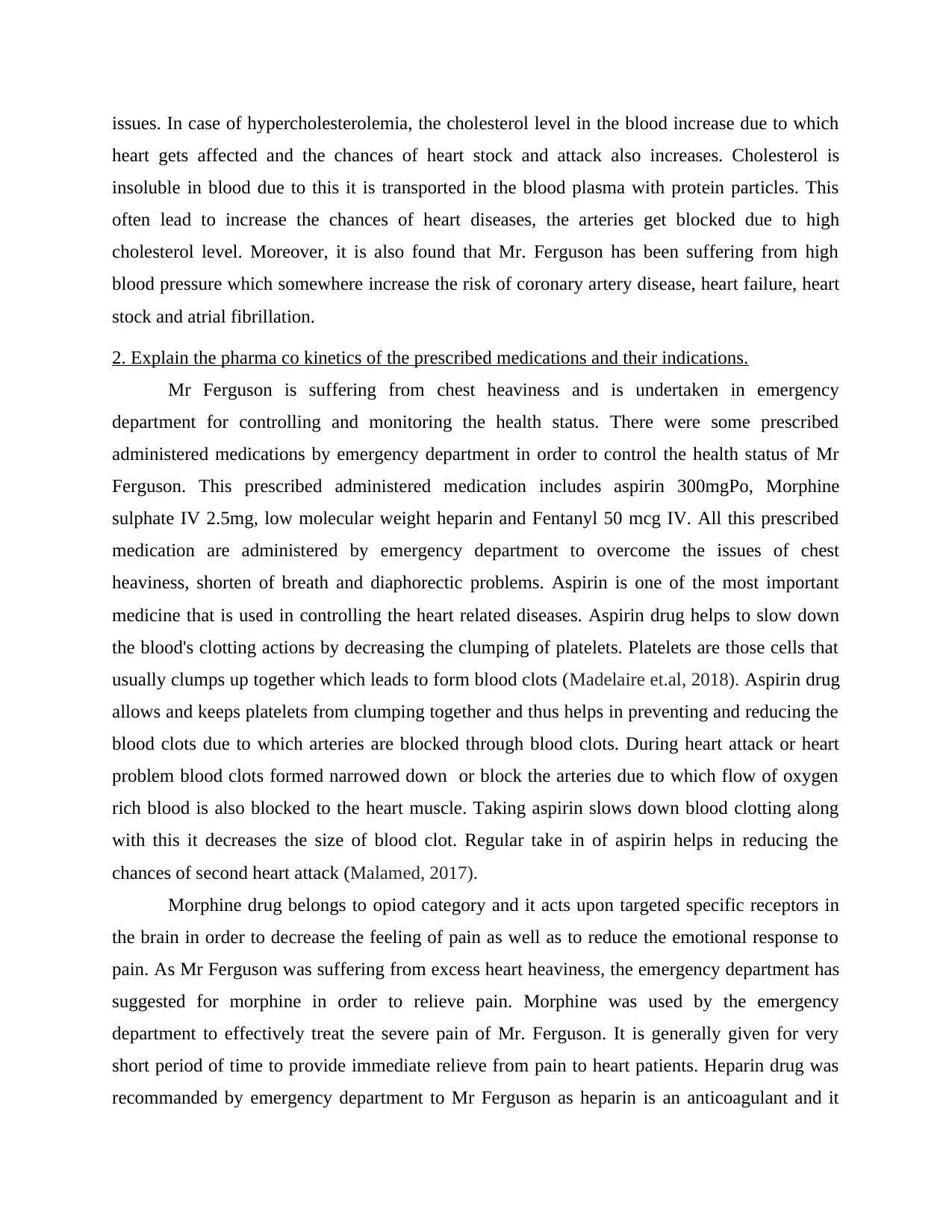
issues. In case of hypercholesterolemia, the cholesterol level in the blood increase due to which
heart gets affected and the chances of heart stock and attack also increases. Cholesterol is
insoluble in blood due to this it is transported in the blood plasma with protein particles. This
often lead to increase the chances of heart diseases, the arteries get blocked due to high
cholesterol level. Moreover, it is also found that Mr. Ferguson has been suffering from high
blood pressure which somewhere increase the risk of coronary artery disease, heart failure, heart
stock and atrial fibrillation.
2. Explain the pharma co kinetics of the prescribed medications and their indications.
Mr Ferguson is suffering from chest heaviness and is undertaken in emergency
department for controlling and monitoring the health status. There were some prescribed
administered medications by emergency department in order to control the health status of Mr
Ferguson. This prescribed administered medication includes aspirin 300mgPo, Morphine
sulphate IV 2.5mg, low molecular weight heparin and Fentanyl 50 mcg IV. All this prescribed
medication are administered by emergency department to overcome the issues of chest
heaviness, shorten of breath and diaphorectic problems. Aspirin is one of the most important
medicine that is used in controlling the heart related diseases. Aspirin drug helps to slow down
the blood's clotting actions by decreasing the clumping of platelets. Platelets are those cells that
usually clumps up together which leads to form blood clots (Madelaire et.al, 2018). Aspirin drug
allows and keeps platelets from clumping together and thus helps in preventing and reducing the
blood clots due to which arteries are blocked through blood clots. During heart attack or heart
problem blood clots formed narrowed down or block the arteries due to which flow of oxygen
rich blood is also blocked to the heart muscle. Taking aspirin slows down blood clotting along
with this it decreases the size of blood clot. Regular take in of aspirin helps in reducing the
chances of second heart attack (Malamed, 2017).
Morphine drug belongs to opiod category and it acts upon targeted specific receptors in
the brain in order to decrease the feeling of pain as well as to reduce the emotional response to
pain. As Mr Ferguson was suffering from excess heart heaviness, the emergency department has
suggested for morphine in order to relieve pain. Morphine was used by the emergency
department to effectively treat the severe pain of Mr. Ferguson. It is generally given for very
short period of time to provide immediate relieve from pain to heart patients. Heparin drug was
recommanded by emergency department to Mr Ferguson as heparin is an anticoagulant and it
heart gets affected and the chances of heart stock and attack also increases. Cholesterol is
insoluble in blood due to this it is transported in the blood plasma with protein particles. This
often lead to increase the chances of heart diseases, the arteries get blocked due to high
cholesterol level. Moreover, it is also found that Mr. Ferguson has been suffering from high
blood pressure which somewhere increase the risk of coronary artery disease, heart failure, heart
stock and atrial fibrillation.
2. Explain the pharma co kinetics of the prescribed medications and their indications.
Mr Ferguson is suffering from chest heaviness and is undertaken in emergency
department for controlling and monitoring the health status. There were some prescribed
administered medications by emergency department in order to control the health status of Mr
Ferguson. This prescribed administered medication includes aspirin 300mgPo, Morphine
sulphate IV 2.5mg, low molecular weight heparin and Fentanyl 50 mcg IV. All this prescribed
medication are administered by emergency department to overcome the issues of chest
heaviness, shorten of breath and diaphorectic problems. Aspirin is one of the most important
medicine that is used in controlling the heart related diseases. Aspirin drug helps to slow down
the blood's clotting actions by decreasing the clumping of platelets. Platelets are those cells that
usually clumps up together which leads to form blood clots (Madelaire et.al, 2018). Aspirin drug
allows and keeps platelets from clumping together and thus helps in preventing and reducing the
blood clots due to which arteries are blocked through blood clots. During heart attack or heart
problem blood clots formed narrowed down or block the arteries due to which flow of oxygen
rich blood is also blocked to the heart muscle. Taking aspirin slows down blood clotting along
with this it decreases the size of blood clot. Regular take in of aspirin helps in reducing the
chances of second heart attack (Malamed, 2017).
Morphine drug belongs to opiod category and it acts upon targeted specific receptors in
the brain in order to decrease the feeling of pain as well as to reduce the emotional response to
pain. As Mr Ferguson was suffering from excess heart heaviness, the emergency department has
suggested for morphine in order to relieve pain. Morphine was used by the emergency
department to effectively treat the severe pain of Mr. Ferguson. It is generally given for very
short period of time to provide immediate relieve from pain to heart patients. Heparin drug was
recommanded by emergency department to Mr Ferguson as heparin is an anticoagulant and it
Paraphrase This Document
Need a fresh take? Get an instant paraphrase of this document with our AI Paraphraser
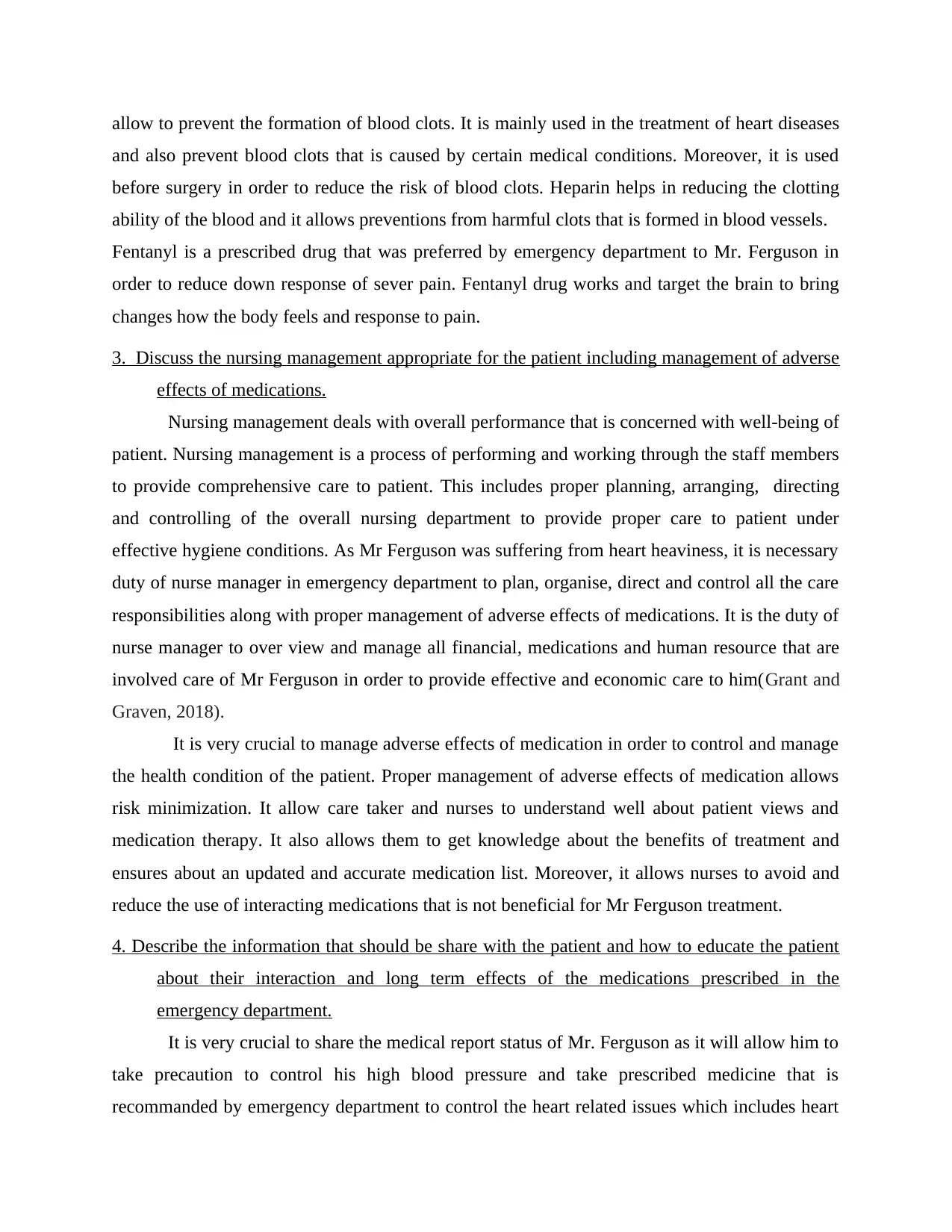
allow to prevent the formation of blood clots. It is mainly used in the treatment of heart diseases
and also prevent blood clots that is caused by certain medical conditions. Moreover, it is used
before surgery in order to reduce the risk of blood clots. Heparin helps in reducing the clotting
ability of the blood and it allows preventions from harmful clots that is formed in blood vessels.
Fentanyl is a prescribed drug that was preferred by emergency department to Mr. Ferguson in
order to reduce down response of sever pain. Fentanyl drug works and target the brain to bring
changes how the body feels and response to pain.
3. Discuss the nursing management appropriate for the patient including management of adverse
effects of medications.
Nursing management deals with overall performance that is concerned with well-being of
patient. Nursing management is a process of performing and working through the staff members
to provide comprehensive care to patient. This includes proper planning, arranging, directing
and controlling of the overall nursing department to provide proper care to patient under
effective hygiene conditions. As Mr Ferguson was suffering from heart heaviness, it is necessary
duty of nurse manager in emergency department to plan, organise, direct and control all the care
responsibilities along with proper management of adverse effects of medications. It is the duty of
nurse manager to over view and manage all financial, medications and human resource that are
involved care of Mr Ferguson in order to provide effective and economic care to him(Grant and
Graven, 2018).
It is very crucial to manage adverse effects of medication in order to control and manage
the health condition of the patient. Proper management of adverse effects of medication allows
risk minimization. It allow care taker and nurses to understand well about patient views and
medication therapy. It also allows them to get knowledge about the benefits of treatment and
ensures about an updated and accurate medication list. Moreover, it allows nurses to avoid and
reduce the use of interacting medications that is not beneficial for Mr Ferguson treatment.
4. Describe the information that should be share with the patient and how to educate the patient
about their interaction and long term effects of the medications prescribed in the
emergency department.
It is very crucial to share the medical report status of Mr. Ferguson as it will allow him to
take precaution to control his high blood pressure and take prescribed medicine that is
recommanded by emergency department to control the heart related issues which includes heart
and also prevent blood clots that is caused by certain medical conditions. Moreover, it is used
before surgery in order to reduce the risk of blood clots. Heparin helps in reducing the clotting
ability of the blood and it allows preventions from harmful clots that is formed in blood vessels.
Fentanyl is a prescribed drug that was preferred by emergency department to Mr. Ferguson in
order to reduce down response of sever pain. Fentanyl drug works and target the brain to bring
changes how the body feels and response to pain.
3. Discuss the nursing management appropriate for the patient including management of adverse
effects of medications.
Nursing management deals with overall performance that is concerned with well-being of
patient. Nursing management is a process of performing and working through the staff members
to provide comprehensive care to patient. This includes proper planning, arranging, directing
and controlling of the overall nursing department to provide proper care to patient under
effective hygiene conditions. As Mr Ferguson was suffering from heart heaviness, it is necessary
duty of nurse manager in emergency department to plan, organise, direct and control all the care
responsibilities along with proper management of adverse effects of medications. It is the duty of
nurse manager to over view and manage all financial, medications and human resource that are
involved care of Mr Ferguson in order to provide effective and economic care to him(Grant and
Graven, 2018).
It is very crucial to manage adverse effects of medication in order to control and manage
the health condition of the patient. Proper management of adverse effects of medication allows
risk minimization. It allow care taker and nurses to understand well about patient views and
medication therapy. It also allows them to get knowledge about the benefits of treatment and
ensures about an updated and accurate medication list. Moreover, it allows nurses to avoid and
reduce the use of interacting medications that is not beneficial for Mr Ferguson treatment.
4. Describe the information that should be share with the patient and how to educate the patient
about their interaction and long term effects of the medications prescribed in the
emergency department.
It is very crucial to share the medical report status of Mr. Ferguson as it will allow him to
take precaution to control his high blood pressure and take prescribed medicine that is
recommanded by emergency department to control the heart related issues which includes heart
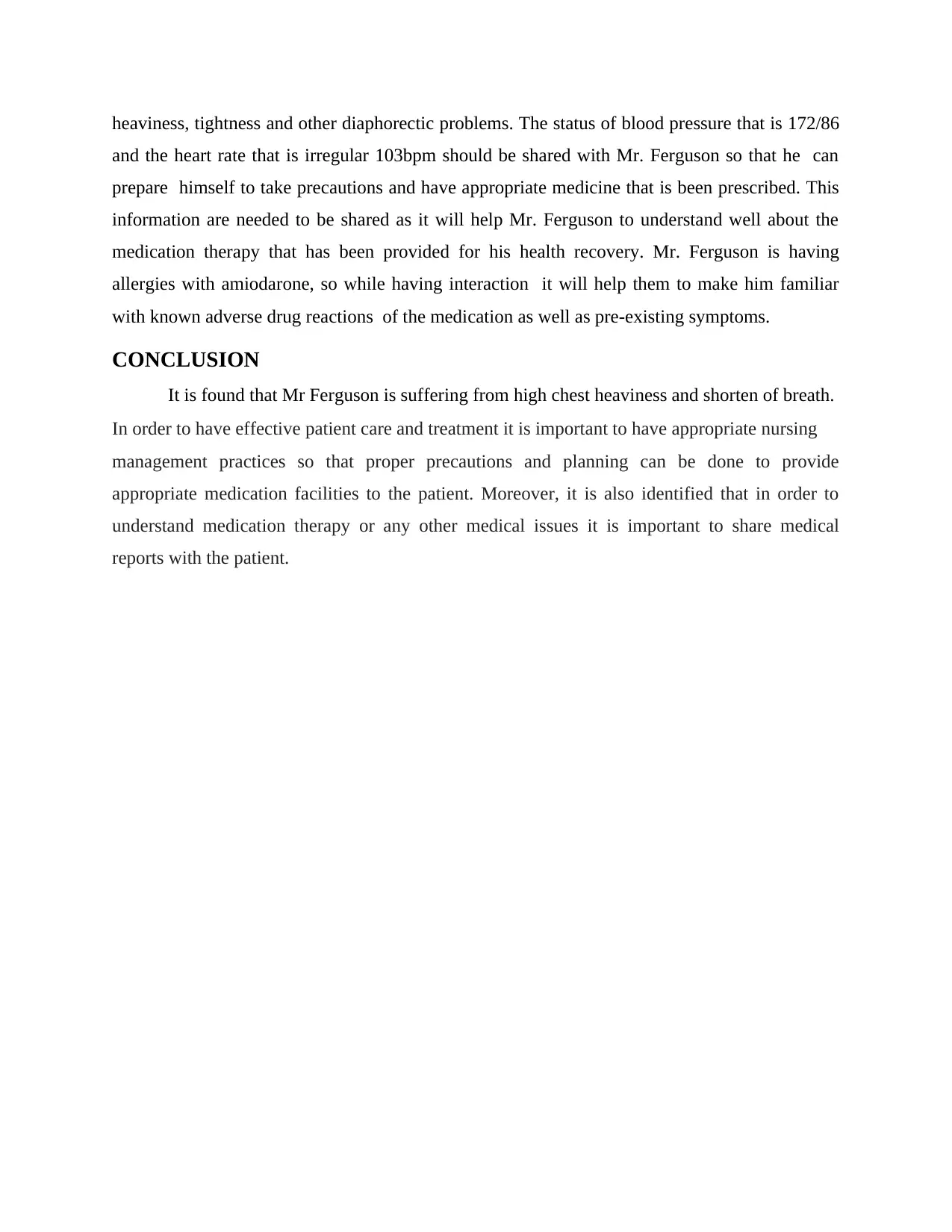
heaviness, tightness and other diaphorectic problems. The status of blood pressure that is 172/86
and the heart rate that is irregular 103bpm should be shared with Mr. Ferguson so that he can
prepare himself to take precautions and have appropriate medicine that is been prescribed. This
information are needed to be shared as it will help Mr. Ferguson to understand well about the
medication therapy that has been provided for his health recovery. Mr. Ferguson is having
allergies with amiodarone, so while having interaction it will help them to make him familiar
with known adverse drug reactions of the medication as well as pre-existing symptoms.
CONCLUSION
It is found that Mr Ferguson is suffering from high chest heaviness and shorten of breath.
In order to have effective patient care and treatment it is important to have appropriate nursing
management practices so that proper precautions and planning can be done to provide
appropriate medication facilities to the patient. Moreover, it is also identified that in order to
understand medication therapy or any other medical issues it is important to share medical
reports with the patient.
and the heart rate that is irregular 103bpm should be shared with Mr. Ferguson so that he can
prepare himself to take precautions and have appropriate medicine that is been prescribed. This
information are needed to be shared as it will help Mr. Ferguson to understand well about the
medication therapy that has been provided for his health recovery. Mr. Ferguson is having
allergies with amiodarone, so while having interaction it will help them to make him familiar
with known adverse drug reactions of the medication as well as pre-existing symptoms.
CONCLUSION
It is found that Mr Ferguson is suffering from high chest heaviness and shorten of breath.
In order to have effective patient care and treatment it is important to have appropriate nursing
management practices so that proper precautions and planning can be done to provide
appropriate medication facilities to the patient. Moreover, it is also identified that in order to
understand medication therapy or any other medical issues it is important to share medical
reports with the patient.
You're viewing a preview
Unlock full access by subscribing today!
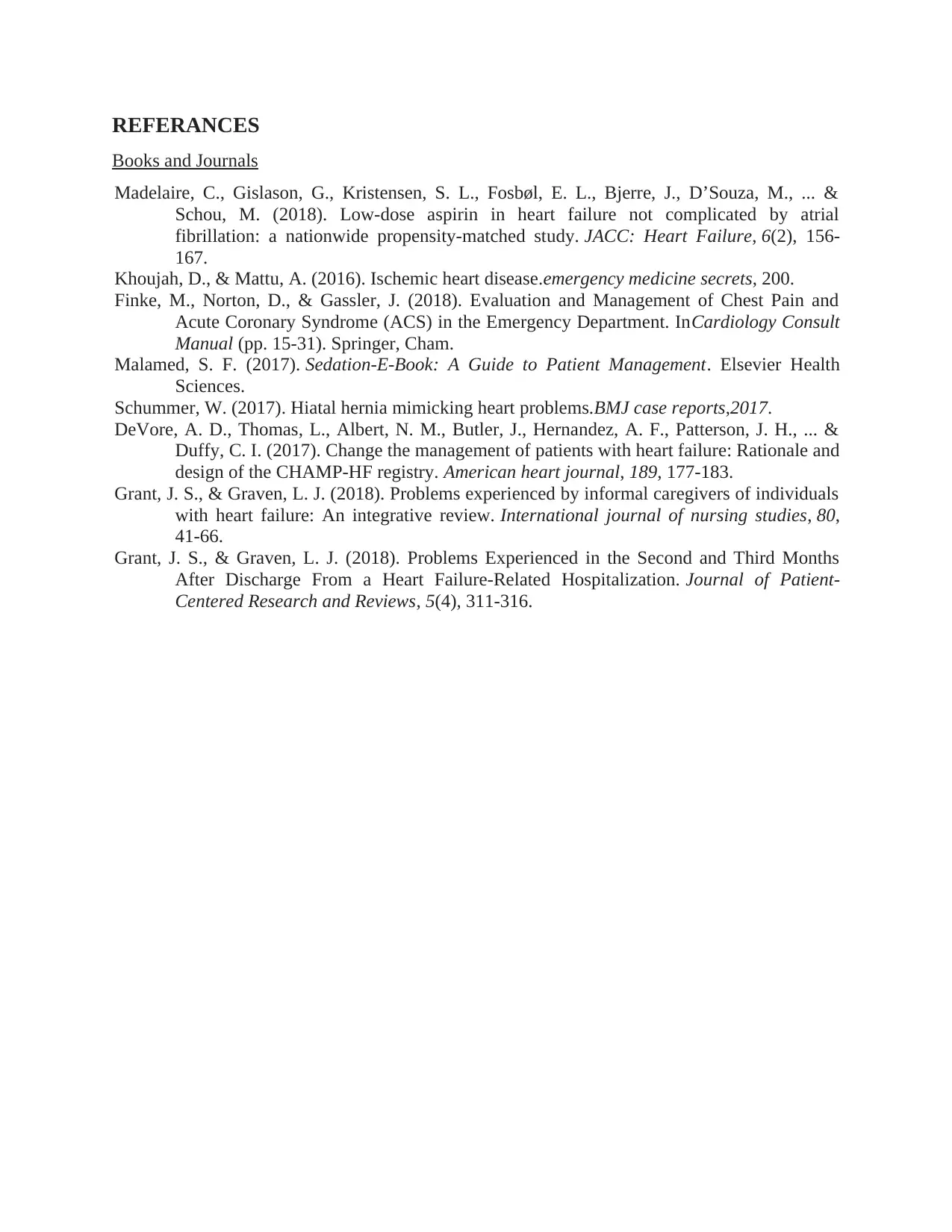
REFERANCES
Books and Journals
Madelaire, C., Gislason, G., Kristensen, S. L., Fosbøl, E. L., Bjerre, J., D’Souza, M., ... &
Schou, M. (2018). Low-dose aspirin in heart failure not complicated by atrial
fibrillation: a nationwide propensity-matched study. JACC: Heart Failure, 6(2), 156-
167.
Khoujah, D., & Mattu, A. (2016). Ischemic heart disease.emergency medicine secrets, 200.
Finke, M., Norton, D., & Gassler, J. (2018). Evaluation and Management of Chest Pain and
Acute Coronary Syndrome (ACS) in the Emergency Department. InCardiology Consult
Manual (pp. 15-31). Springer, Cham.
Malamed, S. F. (2017). Sedation-E-Book: A Guide to Patient Management. Elsevier Health
Sciences.
Schummer, W. (2017). Hiatal hernia mimicking heart problems.BMJ case reports,2017.
DeVore, A. D., Thomas, L., Albert, N. M., Butler, J., Hernandez, A. F., Patterson, J. H., ... &
Duffy, C. I. (2017). Change the management of patients with heart failure: Rationale and
design of the CHAMP-HF registry. American heart journal, 189, 177-183.
Grant, J. S., & Graven, L. J. (2018). Problems experienced by informal caregivers of individuals
with heart failure: An integrative review. International journal of nursing studies, 80,
41-66.
Grant, J. S., & Graven, L. J. (2018). Problems Experienced in the Second and Third Months
After Discharge From a Heart Failure-Related Hospitalization. Journal of Patient-
Centered Research and Reviews, 5(4), 311-316.
Books and Journals
Madelaire, C., Gislason, G., Kristensen, S. L., Fosbøl, E. L., Bjerre, J., D’Souza, M., ... &
Schou, M. (2018). Low-dose aspirin in heart failure not complicated by atrial
fibrillation: a nationwide propensity-matched study. JACC: Heart Failure, 6(2), 156-
167.
Khoujah, D., & Mattu, A. (2016). Ischemic heart disease.emergency medicine secrets, 200.
Finke, M., Norton, D., & Gassler, J. (2018). Evaluation and Management of Chest Pain and
Acute Coronary Syndrome (ACS) in the Emergency Department. InCardiology Consult
Manual (pp. 15-31). Springer, Cham.
Malamed, S. F. (2017). Sedation-E-Book: A Guide to Patient Management. Elsevier Health
Sciences.
Schummer, W. (2017). Hiatal hernia mimicking heart problems.BMJ case reports,2017.
DeVore, A. D., Thomas, L., Albert, N. M., Butler, J., Hernandez, A. F., Patterson, J. H., ... &
Duffy, C. I. (2017). Change the management of patients with heart failure: Rationale and
design of the CHAMP-HF registry. American heart journal, 189, 177-183.
Grant, J. S., & Graven, L. J. (2018). Problems experienced by informal caregivers of individuals
with heart failure: An integrative review. International journal of nursing studies, 80,
41-66.
Grant, J. S., & Graven, L. J. (2018). Problems Experienced in the Second and Third Months
After Discharge From a Heart Failure-Related Hospitalization. Journal of Patient-
Centered Research and Reviews, 5(4), 311-316.
1 out of 7
Related Documents
Your All-in-One AI-Powered Toolkit for Academic Success.
+13062052269
info@desklib.com
Available 24*7 on WhatsApp / Email
![[object Object]](/_next/static/media/star-bottom.7253800d.svg)
Unlock your academic potential
© 2024 | Zucol Services PVT LTD | All rights reserved.





